Sioux Episcopalians celebrate faith family, seek oneness through Jesus at Niobrara ConvocationPosted Jun 27, 2017 |
|
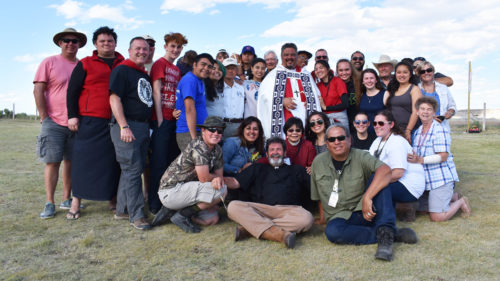
The Red Shirt Project brought a missionary team from the Los Angeles area to Red Shirt Table, South Dakota, to help with the 145th Niobrara Convocation, from June 22-25. The project was created by the Rev. Michael Cunningham, in a black shirt and seated, and the Rev. Robert Two Bulls Jr., seated at right. Photo: David Paulsen/Episcopal News Service
[Episcopal News Service – Red Shirt Table, South Dakota] The congregation here, Christ Episcopal, is known as a family church, where the longtime pastor and family patriarch, the Rev. Robert Two Bulls Sr., has led services for decades in a small building overlooking the western edge of South Dakota’s Badlands on Pine Ridge Reservation.
His ancestors arrived in the Red Shirt area in the late 1800s, “like a ship going through uncharted waters, but they fell in love with this place,” Two Bulls said. They built the first log church here in 1909.
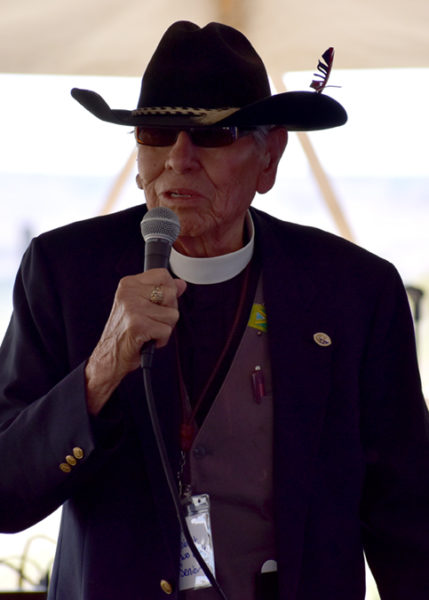
The Rev. Robert Two Bulls Sr. hosted this year’s Niobrara Convocation at his family church, Christ Episcopal, overlooking the west edge South Dakota’s Badlands. Photo: David Paulsen/Episcopal News Service
It is a tiny congregation in one of the poorest counties in the United States, but Two Bulls has long dreamed of hosting the Niobrara Convocation, an annual gathering of Sioux Episcopalians. So last week, in an encampment full of welcoming smiles, few smiles were broader than that of Two Bulls as the 145th Niobrara Convocation convened in a big-top tent next to his church.
Several hundred attended June 22-25, as they have nearly every year since 1870. Two Bulls’ daughter, the Rev. Twilla Two Bulls, was ordained a deacon in the Saturday afternoon service, and Presiding Bishop Michael Curry delivered a rousing sermon June 25 at the convocation’s concluding Sunday service.
Themes of family and oneness seemed to be on the tip of every tongue.
“We all come from one God who made us all, and if we only got one God, I’m your brother,” Curry said toward the end of his half-hour sermon.
Family and relationship-building has been the driving force behind the Red Shirt Project, which served as a common thread running through much of this year’s convocation. The project’s youth missionary team helped with everything from raising the tents to preparing Saturday’s much-anticipated bison dinner.
The Red Shirt Project began in 2000 as a fledgling partnership between Two Bulls’ son, the Rev. Robert Two Bulls Jr., and the Rev. Michael Cunningham. It now organizes an annual summer road trip, bringing young people from the Los Angeles area to South Dakota to work with the local Oglala Lakota community on service projects.
“We’ve got to live the Gospel. We’ve got to work the Gospel,” said Cunningham, rector of St. Mary’s Episcopal Church in Lompoc, California.
Participants on past trips to Red Shirt have helped build a baseball field, an arbor and a straw-bale structure that someday will be used as a coffee shop and store.
“It’s being in the community, doing the work of the Gospel, which is very Lakota,” said Two Bulls Jr., who serves the Diocese of Minnesota as director of its Department of Indian Work. “We always help each other out. It’s just what you do.”
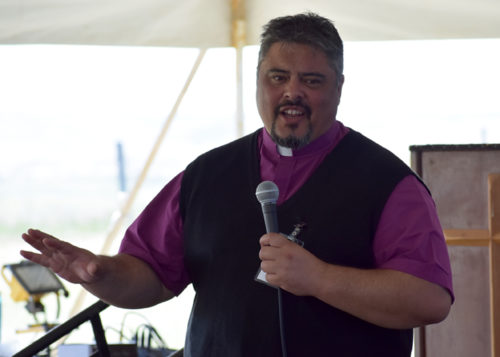
Bishop Don Tamihere speaks June 23 during a business session of the Niobrara Convocation. He was part of a Maori delegation from New Zealand that traveled to South Dakota with the Red Shirt Project. Photo: David Paulsen/Episcopal News Service
This year, the project’s group of 37 missionaries included a six-person Maori delegation from New Zealand, led by Bishop Don Tamihere.
“Indigenous people tend to share a common soul,” Tamihere said.
He and his diocese have been involved with Red Shirt Project for about 10 years, and they were eager to show their support for the Niobrara Convocation. The historic oppression and marginalization that the Maori have experienced in New Zealand mirror American Indians’ plight, he said.
A reunion built on community
The Episcopal Church’s involvement with the Sioux began in the mid- to late-1800s, when the federal government offered land to various Christian denominations in exchange for their complicity in its effort to force Indians to assimilate into the white settlers’ culture through the reservations system.
Today, Niobrara Convocation still functions like a family reunion, with tribal elders and church leaders reporting on what has happened in the past year in their congregations across the Niobrara Missionary District, created in 1871 and including parts or all of what are now North Dakota, South Dakota, Wyoming and Nebraska.
Some of the reports are bleak: Poverty is a persistent challenge in many Native American communities, as it is here. The pool of clergy members is spread thin. Those who are active spend much of their time presiding over funerals. Drug use is on the rise, and suicide is a constant scourge.
“That’s not supposed to happen,” Troy “Scott” Weston, the Oglala Sioux tribal president, said June 23 during one of the business sessions. “We are supposed to give our children a chance to live and be free the way they want to be.”
And yet, these gatherings also are filled with great joy and solidarity. Among the elders and church leaders presenting reports in a session known as “ingathering” was Gladys Hawk of St. Elizabeth’s Episcopal Church in Wakpala, South Dakota. Her son assisted her to the microphone so she could present donations that the congregation raised for the Niobrara Council.
“Even though there are not too many of us [elders] left up there, we stay busy,” Hawk said.
She is 79, and afterward, she said she never misses a Niobrara. This year, she brought a quilt to auction, to raise money for a new multipurpose building at St. Elizabeth’s. The addition would provide the church with access to modern restrooms for the first time, among other improvements.
South Dakota Bishop John Tarrant described Niobrara Convocation as unlike any other gathering on the Episcopal Church’s calendar, starting with its minimal cost to attend – little more than the gas money to get there, if you’re willing to pitch a tent on the grounds.
“This is about relationship,” Tarrant said during the June 23 session. “It’s about relationship with each other, it’s about relationship with God and, I would suggest to you, it’s about relationship with the Earth.”
And the ordination June 24 was a jubilant moment. About 200 turned out for the service, nearly the same number as would attend the worship service the next day and hear Curry’s sermon.
The new deacon, Twilla Two Bulls, 58, was a figure of constant movement over the weekend, accepting congratulations while making the rounds to ensure meal preparation was progressing on schedule.
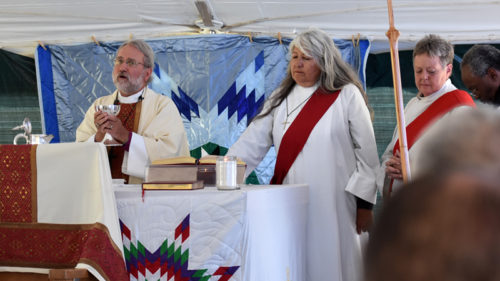
South Dakota Bishop John Tarrant celebrates the Eucharist during the diaconate ordination of the Rev. Twilla Two Bulls, standing next to Tarrant, on June 24. Photo: David Paulsen/Episcopal News Service
She has helped with worship services at Christ Episcopal for 50 years, since she learned to play the church organ as a child. Now as a deacon she will be able to play a greater role in keeping this family church running.
At her ordination, she was surrounded by family, including Cunningham, who has been adopted into the Two Bulls family as a brother. He delivered the service’s sermon, offering Twilla Two Bulls advice and encouragement.
“This, my dear sister, is like no other day of your life,” Cunningham said. “Our lives are lived in community, and it is your community that is affirming what God created in you at your formation. … Look at your family. They are affirming this to you. Your ancestors are here, affirming this to you.”
‘We are one people’
This year’s Niobrara was bittersweet for Cunningham. The Friday morning Eucharistic service, with Two Bulls Sr. as celebrant, was dedicated to the memory of Cunningham’s wife, the Rev. Deborah Dunn, who died suddenly in April from complications of a stroke. She was 65.
Dunn, ordained in 1991, was rector of St. Peter’s Episcopal Church in Santa Maria, California. She and Cunningham had just celebrated their 40th anniversary.
“She was a remarkable priest, a remarkably gifted priest,” Cunningham said.
He still speaks of her death with some difficulty, his emotions still raw, but he said he isn’t one to blame God for such inexplicable loss. Rather, “I do think God’s in the business of comforting us,” he said. And “as hard as it is to be here without my wife, it’s still phenomenal.”
Cunningham, 62, marveled at the notion of oneness found in various indigenous traditions. In the Lakota language, for example, there is a saying, “mitakuye oyasin,” that sometimes is translated “all are related.”
“We’re all connected,” Two Bulls Jr. explained, “because we all live on this Earth.”
Cunningham said he has heard the native people of Alaska use a phrase with a similar meaning. And in New Zealand, the Maori have a saying, “he whanau kotahi tatou,” which means “we are one people.”
Tamihere said he sees parallels, as a Christian, to Jesus’ command to “love your neighbor.” But the Maori also can hear in the New Testament echoes of their own native beliefs.
“Our first response to the Gospel was to say, ‘That’s very familiar,’ ” he said.
“God has done this cool trick,” Tamihere continued. By putting a piece of himself in everyone, “you can’t know God without meeting his people.”
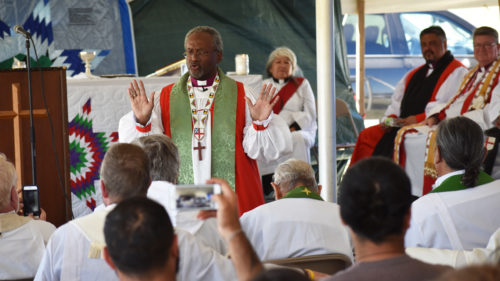
The 145th Niobrara Convocation concluded July 25 with a Sunday service that featured a sermon by Presiding Bishop Michael Curry. Photo: David Paulsen/Episcopal News Service
Curry, in his Sunday sermon, initially was fired up by the Old Testament reading. He used the story of Hagar and her son, Ishmael, in Genesis 21 to make a point about the generational struggle against oppression. God told Hagar to fear not, because Ishmael would grow up to become a great nation.
“We must save the child,” Curry boomed, “because the child you save today may be the adult who saves you tomorrow.”
He repeated the sentence several times in the sermon. He later developed his point in the context of “the dynamics of oppression.” Teach a people to hate themselves and their traditions, and it becomes easy to control them, Curry said, equating the experience of African-Americans to that of Native Americans.
But Curry quizzed the congregation: What were Jesus’ two great commandments? “Love the lord your God,” and “love your neighbor as yourself.”
“And I want to throw in ‘love yourself,’” Curry said. “Teach the children to love God, to love their neighbor, to love each other and love themselves. And I’m telling you, that child in your hand will be blessed by God and can become a great nation.”
The worshipers were receptive to Curry’s message, but the day before, he was on the receiving end of a spiritual challenge.
During the service of ordination, Bishop Tamihere presented several Maori cultural items as gifts to the Episcopal leaders gathered there. He concluded by saying he offered the gifts with a cost attached.
His people suffered for centuries under colonial rule and an Anglican structure that, for much of the church’s time in New Zealand, deprived the Maori of a full voice in their church.
“But we continued to believe in the Gospel and continued to believe in God’s call,” Tamihere said, and now the Maori have won greater autonomy. His position as bishop is evidence of that progress.
Therefore, Tamihere said, the gifts he presented to Episcopal Church leaders come with this cost:
“That you would consider the plight of your native people, that you would do all that you can to alleviate the injustices that are still visited upon them … that you will expend all the energy that you have within your heart, body and soul to raise more native lay leaders, more native deacons, more native priests and more native bishops, so that there will be no injustice to be found in any corner of any diocese that you are responsible for.
“And I implore you to do that in Jesus’ name.”
– David Paulsen is an editor and reporter for the Episcopal News Service. He can be reached at dpaulsen@episcopalchurch.org.

Social Menu